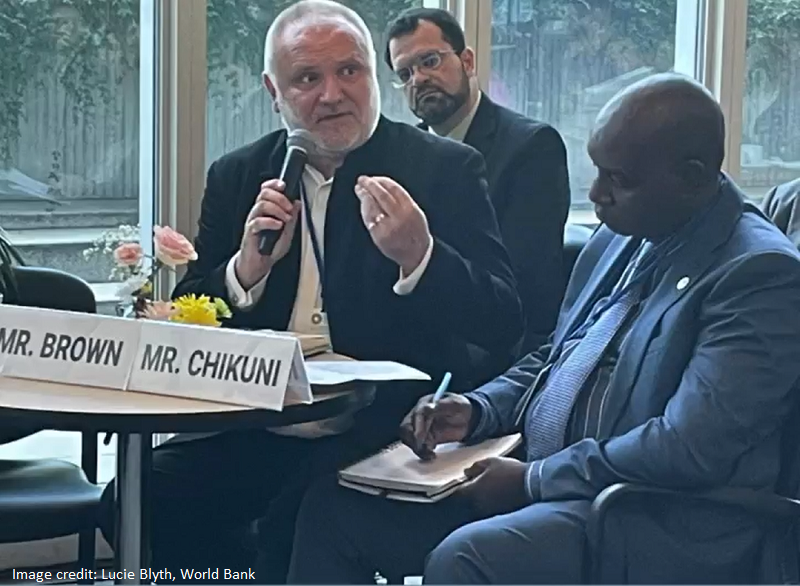
- Date
- 3rd May 2024
- Categories
- electric cooking, Event
Ed Brown (Research Director of MECS; Professor of Global Energy Challenges, Loughborough University), joined colleagues Michelle Hallack (the World Bank), Kandeh Yumkella (SEforALL), Rene van Hell (Ministry of Foreign Affairs of the Netherlands), Chandrasekar Govindarajalu (ESMAP), Alfonso Chikuni (Malawi Ministry of Energy) and Dymphna van der Lans (CCA) at a clean cooking knowledge event at the World Bank Spring Meetings, held 17-19 April 2024, Washington. The event, entitled ‘clean cooking – at the heart of energy access’, showcased the role clean cooking can play in the energy transition while also providing income-generating opportunities and how developing and integrating planning instruments must be at the centre of this process.
During the event, Ed highlighted that the UK aid (FCDO) funded Modern Energy Cooking Services (MECS) programme is a partnership between the World Bank’s Energy Sector Management Assistance Programme (ESMAP) and Loughborough University, and emphasised the following points which are critical for rapidly scaling access to modern energy cooking services worldwide:
1) Clean cooking data. The World Bank is a leading repository for data, but these data are not utilised effectively at the political level. Upon examining how we are making progress on clean cooking, the data used in official tracking is primary fuel use. Modern energy cooking technologies, such as LPG, ethanol, and electricity, are coming into use as secondary fuels but increasing very rapidly. It is important to integrate these data into our international system for monitoring where we are and progress being made towards SDG7 and aligned SDGs.
2) Tackling Affordability. The vast majority of people who do not have access to clean cooking at present are not in that situation because they don’t have access to cleaner stoves, but, rather, it is because they are poor. Tackling the lack of access to clean cooking has to be integrated into wider programmes targeting poverty and scaling access to clean cooking incorporated as one aspect of that. How do we better draw upon the World Bank’s unparalleled understanding of the targeting of social programmes, social payments etc. in the design of clean cooking interventions?
3) Carbon finance is an important mechanism for scaling access to modern energy cooking services in the short-term. Mechanisms of carbon finance for clean cooking are already in operation under MECS, for example we developed the methodology to quantify GHG impacts from metered cooking devices which is already being utilised by companies and being utilised by companies in ways that have already been effective in delivering on the higher tier fuels.
4) Sustainable solutions for addressing the affordability gap. Whilst carbon finance is very important, it will only ever be a partial answer to this question, as it will only last for a limited amount of time. We need to identify long-term sources of finance that will address the affordability gap and help build the capacities of communities in order to access clean cooking. Long-term, the future will be electric, therefore the World Bank has a great responsibility to strengthen the connections between the expertise that exists on electrification and that which is beginning to take hold in the field of clean cooking.
The event concluded with a call for “taking action, together”, where clean cooking must be an integral part of a country’s National Electricity Plan and as part of plans for achieving gender equality.
Listen to Ed’s speech below (video credit: World Bank, Spring Meetings 2024):
…………………………
Featured image: Professor Ed Brown, Research Director, MECS, delivers a speech at the clean cooking knowledge event at the World Bank Spring Meetings (image credit: Lucie Blyth, World Bank).